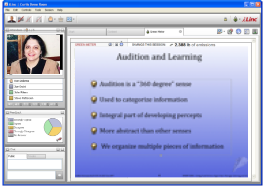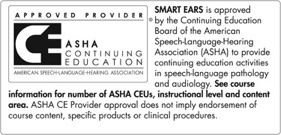Online Workshop Series
Teaching Children with Hearing Loss
to Listen and Talk
The Basics
- Learn the basic principles, concepts, and techniques of Auditory-Verbal Therapy, the science of teaching children with hearing loss to listen and talk.
- Learn AV techniques that you can use to enhance the spoken language part of your program (even when your program is not auditory-verbal, i.e., not a listening-only, spoken language development program)
- Learn practical strategies that you can put to use from day one!
- Learn by watching and analyzing videoclips of actual therapy performed by an expert with over 30 years of experience!
- Earn ASHA CEUs (and LSLS hours)!
AT A GLANCE
Title |
Teaching Children with Hearing Loss to Listen and Talk - The BASICS |
Level |
Introductory (No Pre-requisites) |
Presenter |
Pratibha Srinivasan, Au.D., CCC-A, LSLS-Cert.AVT |
When |
10 AM - 5 PM Eastern Time Date: Not currently scheduled |
Intended Audience |
Teachers of the Deaf, Speech-Language Pathologists, Audiologists, Special Educators & other professionals who work with children with hearing loss. |
CEUs |
 This course is offered for 0.6 ASHA CEUs (Introductory Level, Professional Area) ------------------------------------  This workshop provides 6.0 hours of LSLS CE/Learning credit. ------------------------------------ For other professionals, this course should provide 6 professional development hours. See FAQ below for more information |
Equipment Required |
PC or Mac, USB Headset; or iPad or other tablet; See FAQ for more details. |
Registration |
$99 per participant Click Here to Register Now! |
Time (EST) |
Topic |
||||
|---|---|---|---|---|---|
10:00 TO 11:30 |
Overview of Auditory-Verbal Therapy The key principles and components of a successful auditory-verbal program will be discussed. Participants will learn some benchmarks that measure successful outcomes. Ages and Stages A brief overview of the stages of listening in children with normal hearing will be discussed and how these differ in children with hearing loss. Participants will learn about the factors that affect auditory skill development of deaf and hard of hearing children with an emphasis on how this information is used to develop a long range road map for the child’s spoken language development. |
||||
11:40 TO 1:10 |
Assessment and Goals In this section, we will learn about some basic criterion referenced and standardized assessment tools, as well key elements that a therapist can assess to get started with the program. A procedural outline for how to formulate a strategy to implement goals will be provided, which includes audiological monitoring, parent training and therapy components |
||||
1:10 TO 1:50 |
LUNCH BREAK |
||||
1:50 TO 3:20 |
Key Auditory-Verbal Techniques The when, where, why, and how of key auditory-verbal techniques will be discussed. Many examples will be provided of the use of these techniques for receptive as well as expressive skill development. |
||||
3:30 TO 5:00 |
Putting It All Together The concepts and techniques learned will be integrated in the context of two case studies -- one, of a child between 0-3 years and the other, of a school aged child. A brief background, their goals, course of therapy and outcomes will be covered. Question & Answer Session |
||||
WHAT PEOPLE SAY
Excellent introduction to AVT. Left with some practical ideas of how to implement (G.O., California)
This workshop was very professional and managed well. I would recommend this workshop to others interested in learning about AVT. (J.C., Florida)
My overall impression about this workshop is WOW! I could have sat here longer to hear more and watch more clips. This is a great way to get information. The site was very easy to navigate. Very well done. I can't wait for the next one! (C.S., California)
This was the best workshop I have participated in. The presenter was at ease, knowledgeable, and responsive. I would recommend a Smart Ears workshop to anyone in Early Intervention! (R.K., Colorado)
The workshop presented clear direction for working with children with hearing impairments. The videos illustrated techniques concretely. (C.J., Michigan)
I was impressed by the quality of the workshop and handouts, the personal attention I received from Pratibha Srinivasan, and the amount of material that was covered in this workshop (S.C., North Carolina)
This workshop was filled with wonderful information that I hope to immediately implement in my work. (C.B., Florida)
Very practical and useful information. Great hand-outs! (S.F., Wyoming)
This was a very informative workshop and more practical than most I have been a part of. (E.K., California)
I feel like I am now more prepared to do therapy based on auditory-verbal principles. (E.L., Missouri)
Want to go back and implement some of the ideas heard today. (S.W., Louisiana)
This is a new topic for me and I found this workshop to be a great stepping stone to more valuable and creative listening lessons. (M.D., Florida)
The workshop was very thorough. (M.V., Minnesota)
Practical, functional, useful without being a cookbook. I also found strategies to be appropriate for use in TC programs as well as with children who have intact hearing with language delays. ...... (The workshop was) better than basic. (F.G., California)
You didn't just read the slides to me. You kept me actively involved in the workshop which helped me retain more information (C.J., Alabama)
The presenter is extremely knowledgeable and easy to understand. (J.R., Utah)
The presenter was very open minded about the children's progress in a variety of programs. (E.W., Kentucky)
As a supervisor I want to see my teachers/therapists using the (auditory learning) matrix. (A.B., Louisiana)
Fantastic! Held my interest the whole day! (D.C., New Hampshire)
Best $ for a workshop I have spent! (S.P., Pennsylvania)
Although this workshop was considered “basic” — it was informative and helpful in working with students with hearing impairment. I saw things that I already do in intervention and picked up on several things that I could change to be more effective. (L.L., Nebraska)





